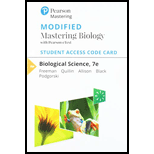
Concept explainers
Which of the following is not a property of DNA polymerase?
a. It adds dNTPs only in the 5' → 3' direction.
b. It requires a primer to work.
c. It is associated with a sliding clamp only on the leading strand.
d. Its exonuclease activity is involved in proofreading.
Introduction:
DNA (deoxyribonucleic acid) polymerase is the enzyme responsible for the replication of DNA. The enzymes incorporate the deoxyribonucleotides (dNTPs) into the newly synthesizing DNA molecule from the template DNA. The sliding clamp acts as a processivity promoter factor in the DNA replication. It is crucial for DNA polymerase binding to the template DNA as it prevents the frequent dissociation of the DNA polymerase from the template DNA.
Answer to Problem 1TYK
Correct answer:
The association with the sliding clamp only on the leading strand is not the property of DNA polymerase.
Explanation of Solution
Explanation/Justification for the correct answer:
Option (c) is given as association of DNA polymerase only with sliding clamp on the leading strand. The DNA polymerase is associated with the sliding clamp protein in the leading as well as with the lagging strand. Hence, the Option (c) is correct.
Explanation for incorrect answers:
Option (a) is given as adding of dNTPs only in the
Option (b) is given as primer is needed for DNA polymerase. The primer is an oligonucleotide (short stretch of DNA or RNA [ribonucleic acid]) and is required for the synthesis of DNA using DNA polymerase. So, it is an incorrect option.
Option (d) is given as proofreading is associated with exonuclease activity of DNA polymerase. The enzyme also has an exonuclease activity for proofreading of newly synthesized DNA. These are the property of DNA polymerase. So, it is an incorrect option.
Hence, the options (a), (b), and (d) are incorrect.
DNA polymerase catalyzes the addition of dNTPs in the
Want to see more full solutions like this?
Chapter 15 Solutions
Modified Mastering Biology With Pearson Etext -- Standalone Access Card -- For Biological Science (7th Edition)
- State the five functions of Globular Proteins, and give an example of a protein for each function.arrow_forwardDiagram of check cell under low power and high powerarrow_forwarda couple in which the father has the a blood type and the mother has the o blood type produce an offspring with the o blood type, how does this happen? how could two functionally O parents produce an offspring that has the a blood type?arrow_forward
- What is the opening indicated by the pointer? (leaf x.s.) stomate guard cell lenticel intercellular space none of thesearrow_forwardIdentify the indicated tissue? (stem x.s.) parenchyma collenchyma sclerenchyma ○ xylem ○ phloem none of thesearrow_forwardWhere did this structure originate from? (Salix branch root) epidermis cortex endodermis pericycle vascular cylinderarrow_forward
- Identify the indicated tissue. (Tilia stem x.s.) parenchyma collenchyma sclerenchyma xylem phloem none of thesearrow_forwardIdentify the indicated structure. (Cucurbita stem l.s.) pit lenticel stomate tendril none of thesearrow_forwardIdentify the specific cell? (Zebrina leaf peel) vessel element sieve element companion cell tracheid guard cell subsidiary cell none of thesearrow_forward
- What type of cells flank the opening on either side? (leaf x.s.) vessel elements sieve elements companion cells tracheids guard cells none of thesearrow_forwardWhat specific cell is indicated. (Cucurbita stem I.s.) vessel element sieve element O companion cell tracheid guard cell none of thesearrow_forwardWhat specific cell is indicated? (Aristolochia stem x.s.) vessel element sieve element ○ companion cell O O O O O tracheid O guard cell none of thesearrow_forward
 Biology Today and Tomorrow without Physiology (Mi...BiologyISBN:9781305117396Author:Cecie Starr, Christine Evers, Lisa StarrPublisher:Cengage Learning
Biology Today and Tomorrow without Physiology (Mi...BiologyISBN:9781305117396Author:Cecie Starr, Christine Evers, Lisa StarrPublisher:Cengage Learning Biology: The Dynamic Science (MindTap Course List)BiologyISBN:9781305389892Author:Peter J. Russell, Paul E. Hertz, Beverly McMillanPublisher:Cengage Learning
Biology: The Dynamic Science (MindTap Course List)BiologyISBN:9781305389892Author:Peter J. Russell, Paul E. Hertz, Beverly McMillanPublisher:Cengage Learning Concepts of BiologyBiologyISBN:9781938168116Author:Samantha Fowler, Rebecca Roush, James WisePublisher:OpenStax College
Concepts of BiologyBiologyISBN:9781938168116Author:Samantha Fowler, Rebecca Roush, James WisePublisher:OpenStax College Human Heredity: Principles and Issues (MindTap Co...BiologyISBN:9781305251052Author:Michael CummingsPublisher:Cengage Learning
Human Heredity: Principles and Issues (MindTap Co...BiologyISBN:9781305251052Author:Michael CummingsPublisher:Cengage Learning Essentials of Pharmacology for Health ProfessionsNursingISBN:9781305441620Author:WOODROWPublisher:Cengage
Essentials of Pharmacology for Health ProfessionsNursingISBN:9781305441620Author:WOODROWPublisher:Cengage





